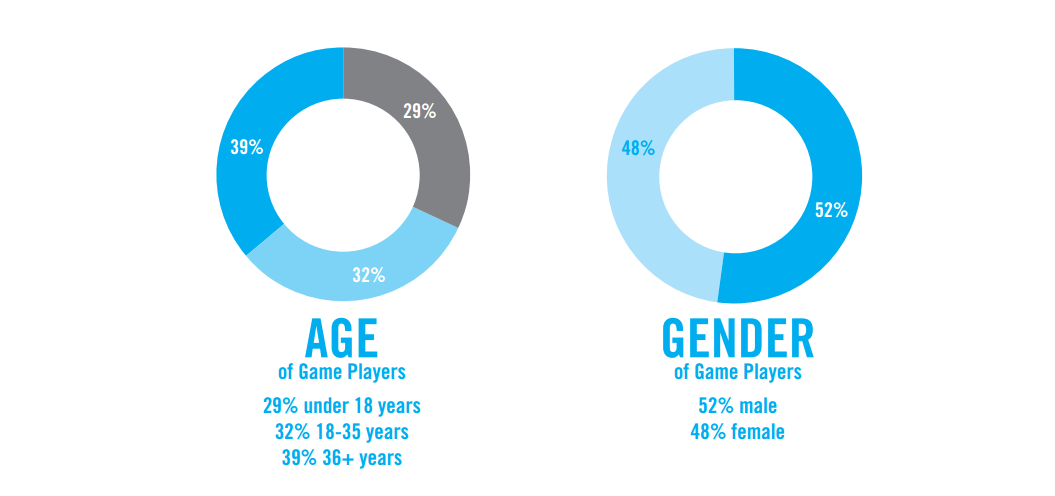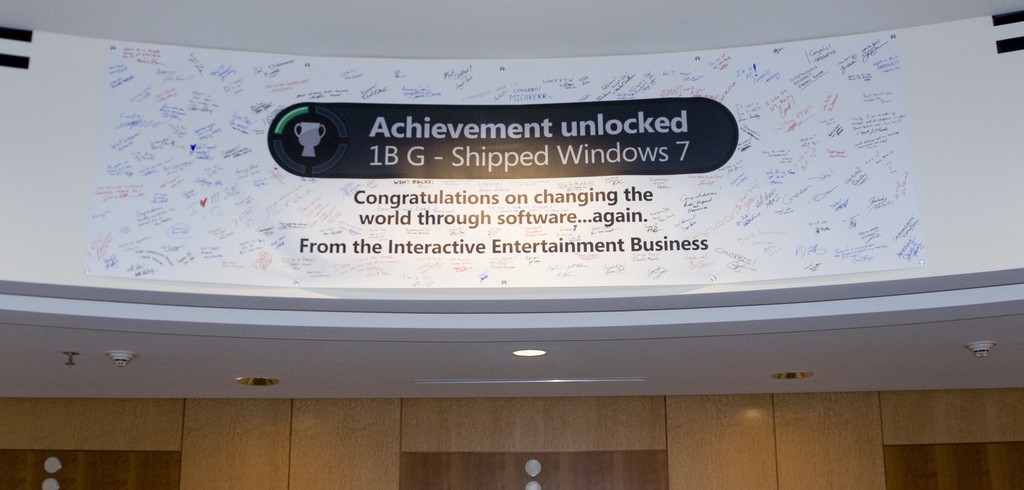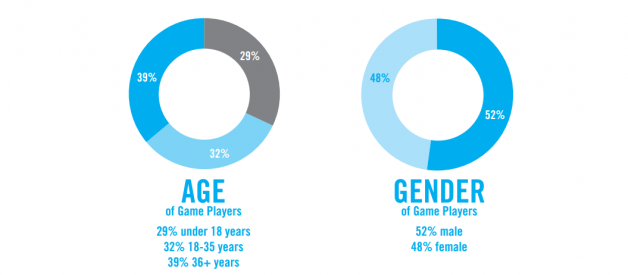By: Anna-Michelle Lavandier
While Madeline Falacci, an undergraduate student at New York University, found her passion in gaming, the negative stereotypes that surround the gaming community has led her to reject identifying herself as a gamer.
?I would have used it before, but it?s kind of been politicized and used a lot for marketing,? Falacci said.? There?s more aside from the literal meaning. There?s so much more now that comes with the term ?gamer.? I just err on the side of not using it for now.?
There are a variety of ways to get involved and be part of this worldwide community linked together by technology, but negative stereotypes keep players away from uniting and being recognized as a community.
Even today, there are still negative attitudes toward gaming that continue to be spread from those outside of the community.
Despite the progress that the overarching gaming community has made toward inclusion the past few years, these stereotypes continue to affect those who would normally consider themselves gamers. While some have been debunked, others continue to be debated.
Here are five examples of stereotypes that have impacted the gaming community.
Stereotype #1: Gaming is a guy thing
Fact: Gaming is an everyone thing
 These, among other statistics, were found in the 2014 study conducted by the Entertainment Software Association.
These, among other statistics, were found in the 2014 study conducted by the Entertainment Software Association.
According to a 2014 study conducted by the Entertainment Software Association (ESA), both men and women are almost equally participatory and invested when it comes to video games. The study concluded that approximately 52 percent of men and 48 percent of women play video games, proving that female gamers are not as rare and elusive as some outsiders may believe there to be.
Jason Allaire, associate professor of psychology at North Carolina State University and co-director of the Gains Through Gaming Lab, says in the study gaming is appealing to both men and women and also to several age groups.
?People of all ages play video games,? Allaire said. ?There is no longer a ?stereotype game player,? but instead a game player could be your grandparent, your boss, or even your professor.?
Stereotype #2: Gaming makes you violent
Fact: Gaming can make you frustrated, but not violent nor have urges to commit crimes
 More recently, first-person shooter (FPS) games, like the Call of Duty series, and the Grand Theft Auto series have been under scrutiny for this claim.
More recently, first-person shooter (FPS) games, like the Call of Duty series, and the Grand Theft Auto series have been under scrutiny for this claim.
In the Brown v. Entertainment Merchants Association case in 2011, the US Supreme Court ruled 7?2 that California could not ban the sale of violent video games to minors. Justice Antonin Scalia wrote in the majority opinion that studies claiming to show a connection between violent video games and negative effects on children ?have been rejected by every court to consider them, and with good reason: They do not prove that violent video games cause minors to act aggressively.?
Stereotype #3: Gamers are lazy/have no future goals
Fact: Gamers can be just as lazy as a non-gamer, but many are ambitious and goal-oriented.
 A congratulations banner from the Interactive Entertainment Business for shipping Windows 7. It?s a play on the icon that appears after achieving a goal in Xbox games.
A congratulations banner from the Interactive Entertainment Business for shipping Windows 7. It?s a play on the icon that appears after achieving a goal in Xbox games.
Edwin Figureroa, a competitive gamer player who specializes in fighting games and has placed in several tournaments in Florida, has seen players turn their hobby into a full-time career. Gamers who have made names for themselves within the community including Peter ?Combofiend? Rosas (with Capcom USA) and Alex Jebailey (founder of CEO Gaming Tournament in Florida) among several male and female tournament placers have had to work hard and dedicate themselves to either a game genre or even a specific game in order to achieve success in gaming, whether it?s in the industry itself or through professional gaming.
?All of them have proven that they?re not ?lazy,? ?immature,? or even ?losers,?? Figueroa said. ?They have a passion for these hobbies, and simply had the skill to turn them into full careers.?
A 2015 study conducted by the Pew Research Center stated that those who consider themselves Black are generally more likely to find positive attributes in video games and are less likely to believe that they are a waste of time.
A 2014 study conducted by the research organization LifeCourse Associates, titled ?The New Face of Gamers,? collected several surveys to analyze a few characteristics of a gamer. One of the results that has come up is that not only are gamers generally not lazy, they are actually more conventionally successful and are more likely to be full-time employees than non-gamers (42 percent vs 39 percent). The study stated that gamers are also more likely to say that they are working in the career they want to be in (45 percent vs. 37 percent).
Stereotype #4: Gamers only like one type of game
Fact: Especially recently, gamers tend to not limit themselves to one genre or series of game. Many gamers play across various platforms.
 An old display showcasing various types of games divided by compatible consoles. What was once a huge divide among gamers with preferred consoles is now a small gap that intersects occasionally.
An old display showcasing various types of games divided by compatible consoles. What was once a huge divide among gamers with preferred consoles is now a small gap that intersects occasionally.
The early days of gaming encouraged brand loyalty and console exclusivity through commercials. This behavior began very early on with Atari, Sega and Nintendo leading the way, and later included Microsoft?s Xbox and Sony?s PlayStation. These days, however, many gamers own or have played on multiple devices which gives them access to a variety of games across genres.
Charles Pratt, an assistant professor at the NYU Tisch School of the Arts, teaches a number of the game design classes offered for undergraduate and graduate students and has played a role in designing a few games. From his research, he believes that the community will become more intertwined from here.
?I don?t really know people who only play one kind of game at this point,? Pratt said. ?At this point, people play all kinds of games. In some ways, the old divisions for players, those have started to fall away. It?s given me insights on how a community revolves around games. Seeing that first-hand is really interesting. We?re a community of people who take games seriously.?
Stereotype #5: Gamers are loners or socially inept
Fact: Gamers sometimes choose not to express their interest, in fear of shaming, so some may decide to move the social aspect to the online space. Others find camaraderie with other gamers.
 Crowds of people are waiting together for the release of Portal 2.
Crowds of people are waiting together for the release of Portal 2.
Missy Sentieno, a second-year graduate student at NYU studying game design, enjoys being part of the active gaming community at NYU after being rejected by others offline for her gaming hobby in her childhood.
?I?ve been shamed by non-gamers and I felt that I had to hide that part of me,? Sentieno said.?I?ve never felt in my immediate community that I?ve been bombarded. I?ve felt most alienated by characters. Tony Hawk was the first game that I could play as a female or black character. But I was disappointed that there wasn?t a female black character.?
The LifeCourse Associates study found that gamers lead more social lives than non-gamers and are more likely to be living with other people (this included family, friends, roommates or significant others). Approximately 72 percent of gamers stated that they game with their friends. As for other forms of social interaction, only 23 percent of gamers claim that they watch television alone, as opposed to 40 percent of non-gamers, while 42 percent will watch videos on the computer, phone or television with friends while visiting.
The Nerd Castle is an ongoing master?s capstone project with the CUNY Graduate School of Journalism that will be used to explore, showcase and expose diversity and the issues surrounding it within the gaming community.
Anna-Michelle can be found on Twitter @amlavandier. The Nerd Castle can also be found on Facebook and Instagram.


